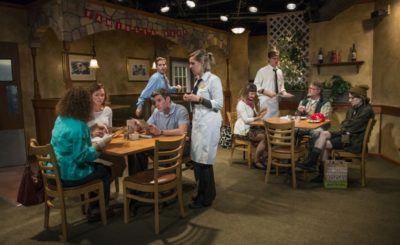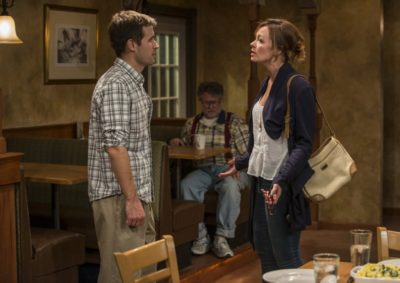Pocatello
Directed by Jonathan Berry
Produced by Griffin Theatre
At Signal Ensemble, Chicago
Well acted ensemble slice-of-life drama about a dying community
Playwright Samuel D. Hunter (The Whale) loves to place his plays in Idaho. His latest, Pocatello, laments the decline of that small town where reminders of past glories are now overtaken by the Walmarts, Applebees, McDonald’s, and obscene strip-malls. As local industry leaves, local folks must either work fast-food or big box outlets or relocate, making it difficult to forge a lasting sense of community. Pocatello is the 21st Century version of dying small town dramas that remind me of Sherwood Anderson’s Winesburg, Ohio, William Inge’s Picnic, and Neil LaBute’s Reasons to Be Pretty, and Larry McMurtry’s film, The Last Picture Show.
Hunter’s drama features the manager and staff of an Italian chain restaurant (Olive Garden?) who struggle to keep afloat as family-style restaurants keep closing in rural America. Eddie (Michael McKeogh) is the nostalgic for-the-past lonely single manager desperately clinging to his town and to his past life, which has completely left him. On this day, he is doing a “family week” promotion that brings his family, mother Doris (Lynda Shadrake) and visiting brother Nick (Sam Guinan-Nyhart) and his new wife Kelly (Nina O’Keefe) to the restaurant. Tension is on the menu as Nick and Eddie spat and mother complains about gluten free pasta. This reunion is doomed.
At the other family table, we meet waiter Troy (Bob Kruse) as he waits on his wife, Tammy (Mechelle Moe), and her father-in-law Cole (Sandy Elias), a dementia sufferer. Becky (Becca Savoy) is the obnoxious 17 year old self-styled leftist reluctant to eat most foods. Troy and Tammy’s 19 year marriage is in trouble, due mainly to Tammy’s alcoholism. Max (Morgan Maher) is the meth-head now in rehab that Eddie hired as a waiter. Isabelle (Allie Long) is the waitress without a family just struggling to survive.
As Eddie finds out that this Italian franchise will soon close, he becomes obsessed with keeping the status quo in his life. His issues with his mother after his father’s suicide (after his own beloved diner closed) and his coming out as gay to his mother, led to a lack of closeness with her. The two shared many dinners together. Eddie simply won’t let go of the past.
Pocatello is another example of the melancholy that drips over many dying rural towns in the heartland. These characters are so attached to the town that they find it difficult to move to places where they can find better economic opportunities. Why Eddie, a lonely man with few reasons to stay in Pocatello, is so trapped here physically and emotionally, I can’t relate to. Maybe because I’m a big city survivor, I didn’t feel his angst. You’d think that a single, unattached lonely man estranged from his mother would move on since he has nothing to lose by leaving Pocatello. Yet, Eddie desperately tries to get the family and his mother to be together again and isstruggling to show corporate that the franchise should remain open. He can’t face reality.
The conclusion is powerful, emotional, and, to me, unsatisfying, yet many audience members found it heartbreaking. Michael McKeogh leads a fine cast and director Jonathan Berry makes the show flow nicely in this moving 95 minute drama. Pocatello is worth a visit.
Recommended
Tom Williams
Talk Theatre in Chicago podcast
Date Reviewed: November 22, 2015
For more info checkout the Pocatello page at theatreinchicago.com
At Signal Ensemble, 1802 W. Berenice, Chicago, IL, call 866-4111, www.griffintheatre.com, tickets $36, students/seniors $31, Thursdays thru Saturdays at 7:30 pm, Sundays at 3pm, running time is 95 minutes without intermission, through December 13, 2015




